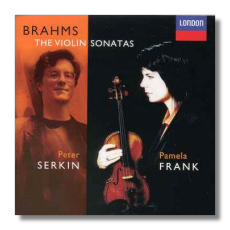
The Internet's Premier Classical Music Source
Related Links
- Brahms Reviews
- Latest Reviews
- More Reviews
-
By Composer
-
Collections
DVD & Blu-ray
Books
Concert Reviews
Articles/Interviews
Software
Audio
Search Amazon
Recommended Links
Site News
 CD Review
CD Review
Johannes Brahms

Violin Sonatas
- Violin Sonata #1 "Rain" in G Major, Op. 78 (1879)
- Violin Sonata #2 in A Major, Op. 100 (1886)
- Violin Sonata #3 in D minor, Op. 108 (1886)
Itzhak Perlman, violin
Vladimir Ashkenazy, piano
EMI 66945


- Violin Sonata #1 "Rain" in G Major, Op. 78 (1879)
- Violin Sonata #2 in A Major, Op. 100 (1886)
- Violin Sonata #3 in D minor, Op. 108 (1886)
Pamela Frank, violin
Peter Serkin, piano
London 455643
EMI's "Great Recordings" issues are of variable merit. I have reservations calling Previn's Gershwin 'great', for example. And, while these EMI recordings are excellent Brahms, I do find at least one other recording I consider "better". At the same time, this release is far superior to an earlier EMI (non-'great') release with Chung and Frankl. That record was one of the biggest disappointments I have listened to. I love most of what Chung has recorded. Her Sibelius/Tchaikovsky record, with Previn on Decca, was my first experience with her and the music. I treasure it still. In the Brahms, however, her tone was thin and the recording is dry as a desert. I won't go on about that disc.
This EMI release is much fuller in sound than the Chung issue. Perlman's arm digs into the music, wringing more emotion out of every note than Chung does in the entire piece. (OOPS… I meant to leave that alone) Ashkenazy's pianism is fascinating. In fact, as I listen to this record I begin to believe that maybe the hype is right. Perhaps Perlman is one of the finest violinists of this century. (I certainly rank him higher than Heifetz whose playing I have always felt was awesome but not lovable) The playing has a salon atmosphere to it. There is a definite dialogue between the players, but it seems just slightly detached to my ears.
I like my Brahms "Romantic" to the core. This is what Pamela Frank and Peter Serkin offer in spades. If Perlman wrings more music from the notes than does Chung, Frank is a damn wizard! She is to the violin as Stokowski was to the orchestra. The dialogue here is one between lovers; it is sensual. Where Perlman's seamless bowing caresses the music, Frank makes love to it. The timings of the two recordings are almost the same, but the rubato is completely different. Frank lingers here and there where Perlman moves along. Frank finds a gypsy like sound at moments that I don't hear in Perlman.
Let me take the fifth track as an example. Malcolm MacDonald, in the notes, comments, "Possibly because of all instrumental combinations he found it (the piano and violin or viola) most nearly approached the state of wordless song…." This is what best explains what Frank and Serkin bring to the music. It is here that Serkin reminds me of Schubert's "Trout". Ashkenazy at this point (about 5 minutes into the movement) here offers wonderful playing, but it is of the 'salon' type of atmosphere, it is intimate but not passionate. Whatever that means and I know it means something. Frank is tender, almost playing a lullaby. Perlman is romantic in a 'distant sort of way'.
So, while I like the Perlman and Ashkenazy, I love the Frank and Serkin recording. I am glad I have both in my collection. I recommend both as a listening lesson for those who want to realize that music is much, much more than black marks on white paper.
Copyright © 1999, Robert Stumpf II



















